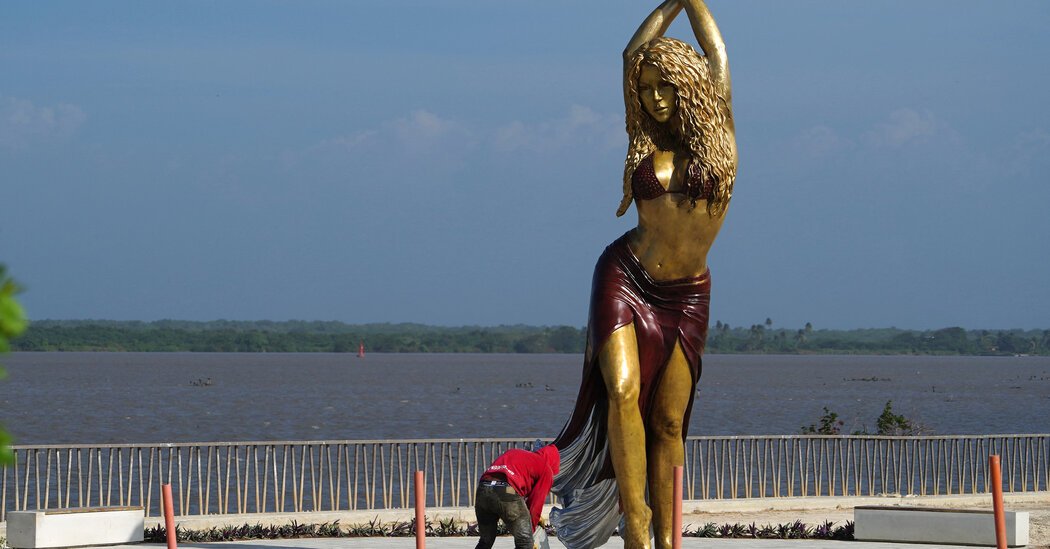The Colombian coastal city of Barranquilla this week revealed a 21-foot-tall tribute to one of the country’s most famous cultural exports: Shakira.
“A heart that composes, hips that don’t lie, an unmatched talent, a voice that moves the masses and bare feet that march for the good of children and humanity,” reads the plaque below the statue.
“I am honored and moved by this incredible recognition in my Barranquilla, the city where I was born,” Shakira said in a statement. “Every barranquillero and barranquillera are my brothers and sisters and the inspiration of my life since my childhood.”
The statue’s sculptor, Yino Márquez, said he was delighted by the way the sculpture had been received by the public and by Shakira and her family after it was unveiled on Tuesday. The singer’s mother, he said, told him that God would bless his hands for being such a good sculptor.
“Shakira herself called me and told me that I captured her essence very well in the sculpture. That her son saw the sculpture and said that it is the most beautiful sculpture he has ever seen,” Mr. Márquez said.
The 52-year old artist said he had been working on sculptures since he was 16. He has made large statues for other Colombian cities and is an academic coordinator at Barranquilla’s public art academy.
In June, the mayor of Barranquilla, Jaime Pumarejo, called to let him know that he was a candidate to create a sculpture of Shakira that the city wanted to erect on the waterfront. He found out he had been chosen about a month later, when the mayor announced it to the public.
Mr. Pumarejo said that about a year ago, he started thinking about ways to honor significant Barranquilla figures as a way to increase tourism and serve as role models for young people. City officials decided on a statue representing the coat of arms of Barranquilla, and one of Shakira, who the mayor said agreed to the idea.
Together, the two statues cost around $700 million Colombian pesos, or $180,000, he said.
“It was a monumental task,” he said. But he added that he was more than happy with the results. “I think that in the end it is much more than we expected.”
Shakira, 46, who lives in Spain, was born in Barranquilla, a port city of 1.2 million people and long the home of many Colombian-Lebanese families like hers.
Though she lives abroad and goes on tours, she has maintained a close relationship with the city. She comes back to visit several times a year, has financed several schools and founded a foundation that works to improve early childhood education in the country.
“Between the Syrian-Lebanese dances mixed with the flavors of the Caribbean that are embodied in her hips, in the way she dances, they show a Barranquilla of migrants, a Barranquilla open to the world and to integration and diversity,” Mr. Pumarejo said. “They also show a woman who dared and succeeded.”
The statue, which took five months to complete, shows Shakira wearing a maroon outfit and performing her famous belly dance. Mr. Márquez first modeled it in clay, then made a silicone and fiberglass mold, and finally cast it in bronze.
The end of her skirt, made of aluminum, symbolizes the waves of the Caribbean Sea and the Magdalena river, Mr. Márquez explained. He added that her upraised arms will eventually hold a light that will turn on at night.
Mr. Márquez said he first met Shakira, whose full name is Shakira Isabel Mebarak Ripoll, when she was around 15 and starting to gain recognition as a performer in Colombia. Some of his classmates at art school he recalls, would help her with her stage design.
“I just saw her walking the halls and I didn’t pay much attention at that time,” he said. Over time he came to admire her hard work and success.
“Shakira is a symbol of effort, discipline and progress,” he said. “For me, she is a fighter.”
When he took on the task of sculpting her likeness, he said she was heavily involved in the process and came to Barranquilla to meet with him in person so he could make the sculpture as accurate as possible.
“I found a more affable and kind person than I had imagined and with a big laugh and smile,’’ he said.
One day after the statue’s unveiling, tourists from around the country had already gathered around the Barranquilla boardwalk to see the new landmark and take selfies. Many praised what they saw as the accuracy of the sculpture and its significance to Colombians.
“I’ve always loved her, but especially since she gave Piqué the boot,” said Cindy Avila, a 33-year-old content creator from the northern city of Sincelejo, referring to her estranged husband, Gerard Piqué. “We all grew up admiring her, wanting to dance, wanting to dress like her.”
María Paula Giraldo, a 54-year-old ceramist from Bogotá, the capital, said the statue “makes us feel very proud to be Colombians. It also represents an icon, a woman who has done so much for Colombia,” she said. “I grew up with her music. It has been with us on walks, parties and dances.’’
Amparo Pacheco, a 62-year old Colombian businesswoman who was visiting from Spain, where she lives, said the “sculpture makes you feel like you’re in the Caribbean. She is from this land.”
Ivonne Arroyo contributed reporting from Barranquilla.





